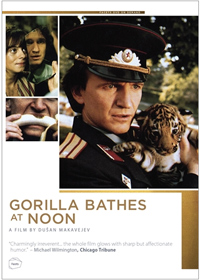 A conversation about Serbian cinema wouldn’t be complete without at least a passing reference to trailblazer Dusan Makavejev, at the forefront of the Yugoslav Black Wave film movement in the late 60s and 70s, wherein filmmakers were subversively critiquing the increasingly conservative social norms in Yugoslavia. Makavejev gained international acclaim when his fourth feature, 1971’s W.R.: Mysteries of the Organism was banned in his native country, forcing him to work abroad, developing his still provocative examination of sexuality, Sweet Movie in Canada. But in the decades since, he would develop only five more projects (one of those a television documentary), his last completed feature to date being 1993’s Gorilla Bathes at Noon. Credited as a screwball comedy (though Makavejev’s version of such antics aren’t quite revealed in any sort of straightforward, classical understanding of comedic tropes or timing), a lonely Red Army soldier is stranded in East Berlin shortly before the collapse of the Berlin Wall and wanders aimlessly around the city having bizarre interactions with people and animals. Lacking the same of sexual insurgency marking his most infamous titles, this is a dialed down, amiable attempt at charming his audience into political reflection, but is a narrative tethered to such a specific place and time it is also without the same transcendence feeding the legacy of his earlier items of note.
A conversation about Serbian cinema wouldn’t be complete without at least a passing reference to trailblazer Dusan Makavejev, at the forefront of the Yugoslav Black Wave film movement in the late 60s and 70s, wherein filmmakers were subversively critiquing the increasingly conservative social norms in Yugoslavia. Makavejev gained international acclaim when his fourth feature, 1971’s W.R.: Mysteries of the Organism was banned in his native country, forcing him to work abroad, developing his still provocative examination of sexuality, Sweet Movie in Canada. But in the decades since, he would develop only five more projects (one of those a television documentary), his last completed feature to date being 1993’s Gorilla Bathes at Noon. Credited as a screwball comedy (though Makavejev’s version of such antics aren’t quite revealed in any sort of straightforward, classical understanding of comedic tropes or timing), a lonely Red Army soldier is stranded in East Berlin shortly before the collapse of the Berlin Wall and wanders aimlessly around the city having bizarre interactions with people and animals. Lacking the same of sexual insurgency marking his most infamous titles, this is a dialed down, amiable attempt at charming his audience into political reflection, but is a narrative tethered to such a specific place and time it is also without the same transcendence feeding the legacy of his earlier items of note.
Red Army officer Borisovic (Svetozar Cvetkovic) is left behind in the streets of East Berlin when his unit deserts him. Homeless, he wanders the city, interacting with various denizens, such as a friendly police officer and a Turkish girl with an aggressive boyfriend. Eventually, his wife tells him over the phone she’s leaving him and Borisovic becomes a peripheral member of a group of black market dealers, sharing his stolen food items with them (such as bananas and slabs of meat from the zoo). Eventually, he becomes chummy with a young refugee woman.
Established Serbian actor Svetozar Cvetkovic (he’s appeared in over eighty films, including Makavejev’s 1981 title Montenegro) is rather haphazardly charming as Borisovic, who sometimes resembles a young Ralph Fiennes. Stealing from food vendors and, eventually, zoo animals, his various interactions lead him to a ragtag crew of similar scroungers working in collusion with a black market-type dealer who dresses like a cartoon villain. Of more interest is Borisovic’s relationship with Miki Miki (Anita Mancic), a refugee who also appears to him as Lenin in drag. The politically minded cross dressing (wherein Lenin has a tendency to shower Borisovic in tender kisses) calls to mind something Fassbinder would have staged over a decade prior.
Makavejev intercuts Borisovic’s adventures with film clips from a 1950 Russian propaganda film, The Fall of Berlin. Filmed in sickly Sovcolor, Stalin (an eerily made up Mikheil Gelovani) flies into the defeated city to the open, welcoming arms of the Germans. Meanwhile, in Makavejev’s landscape, he juxtaposes this finale with the dismantling of a gigantic Lenin statue in East Berlin (which Borisovic painstakingly washed, courting the attention of the press earlier in the film for one of the film’s more chuckle worthy moments), the decapitated head jetted off somewhere in the city, the valiant Red Army soldier caressing its ear as he escorts it through the city.
Amusing, yet mostly isolated in terms of its particular period, Gorilla Bathes at Noon is also, upon closer examination, one of Makavejev’s darkest comedies. The aimless disenchantment with the present is interjected only by snippets of blatant propaganda, a sign of the revisionist fodder always thrust upon the masses in retrospect. In the end, mankind’s statues of homage, whether they are the semblance of Lenin or his primate cousin of the title, are objects treated equally by the elements, covered in fecal matter and miscellaneous debris.
Disc Review:
Facets, which owns several more obscure properties of Makavejev, releases the title as a DVD-R on-demand selection. Certainly, there’s something to be said about availability, but the transfer indicates restoration is imperative, as several sequences reveal severe damage to whatever print this is lifted from. Additionally, the footage used from Mikheil Chiaureli’s The Fall of Berlin looks extremely overexposed and faded.
Final Thoughts:
Though it’s not the best starting point into Makavejev’s discordant filmography, Gorilla Bathes at Noon is in keeping with his penchant for political ironies and though much less sensational than his most famous works, is still worth a look.
Film Review: ★★½/☆☆☆☆☆
Disc Review: ★★½/☆☆☆☆☆


